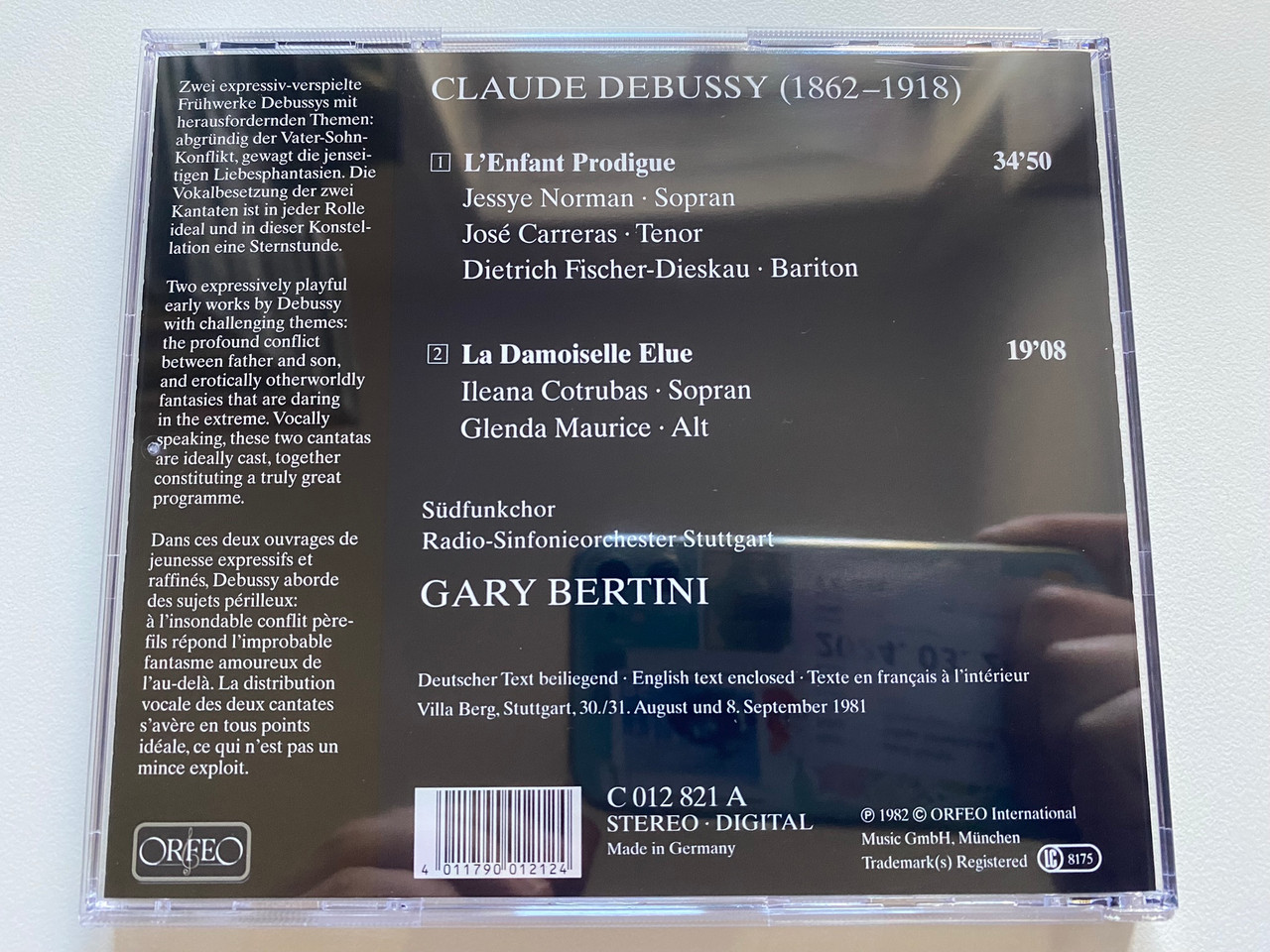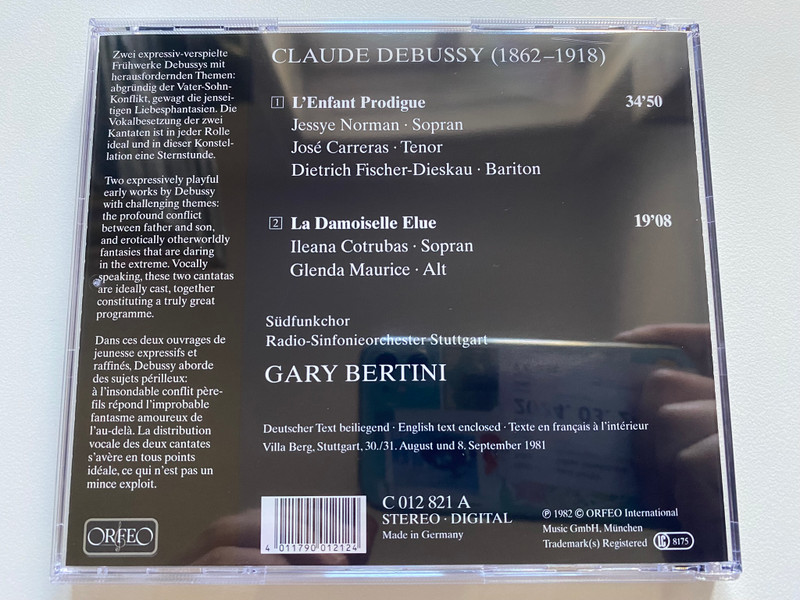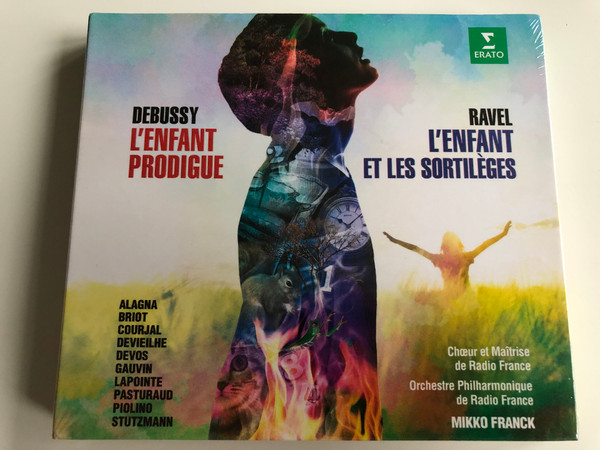Description
Claude Debussy: L'Enfant Prodigue - A Captivating Lyric Scene for Voices
Product Information
- UPC: 4011790012124
- Product Type: Audio CD
- Label: Orfeo
- Catalog Number: C 012 821 A
- Genre: Classical
- Style: Impressionist
Overview
"L’Enfant Prodigue" (The Prodigal Son) is a deeply emotional scène lyrique composed by Claude Debussy with a libretto by Édouard Guinand. Premiered on June 27, 1884, in Paris, this cantata marked a turning point in Debussy’s career, securing him the Prix de Rome, the highest musical distinction in France at the time. The work stands as an early testament to Debussy's burgeoning genius, already foreshadowing the impressionistic language that would later define his legacy.
This exceptional recording brings together an outstanding ensemble of vocalists, including Jessye Norman, José Carreras, and Dietrich Fischer-Dieskau. Their expressive interpretations bring depth and nuance to the roles of Lia (the mother), Azaël (the prodigal son), and Siméon (the father), each embodying the emotional core of the narrative. The performances are further enriched by the sensitivity of the orchestral accompaniment, which underlines the work’s dramatic arcs and tender lyricism. The cantata retells the biblical parable of the prodigal son with powerful emotional resonance. Debussy’s music captures the pain of separation, the sorrow of regret, and the joy of reconciliation through richly textured harmonies, flowing melodic lines, and orchestral colors that evoke a vivid sense of atmosphere and inner reflection. The intimate nature of the piece, combined with its universal theme of forgiveness, continues to move audiences today. A vital piece in the early development of Debussy’s compositional voice, L’Enfant Prodigue is more than just a student work—it is a lyrical and emotional miniature opera that demonstrates his deep understanding of human emotion and dramatic expression.
German Translation - Overview
"L’Enfant Prodigue" (Der verlorene Sohn) ist eine ergreifende scène lyrique von Claude Debussy, basierend auf einem Libretto von Édouard Guinand. Das Werk wurde am 27. Juni 1884 in Paris uraufgeführt und brachte dem jungen Debussy den Prix de Rome ein – eine der höchsten musikalischen Auszeichnungen Frankreichs. Diese Kantate gilt als Meilenstein in Debussys früher Schaffensperiode und zeigt bereits stilistische Merkmale seines späteren impressionistischen Schaffens.
Diese herausragende Aufnahme vereint drei der bedeutendsten Stimmen des 20. Jahrhunderts: Jessye Norman, José Carreras und Dietrich Fischer-Dieskau. Sie verleihen den Hauptfiguren Lia, Azaël und Siméon nicht nur stimmliche Brillanz, sondern auch große emotionale Tiefe. Die orchestrale Begleitung unterstreicht mit großer Sensibilität die dramatischen Wendungen und die lyrische Ausdruckskraft der Komposition. Debussy vertont die biblische Parabel vom verlorenen Sohn mit eindrucksvoller musikalischer Sprache. Die Musik spiegelt Trauer, Reue und schließlich Versöhnung wider – umgesetzt durch schwebende Harmonien, expressive Melodiebögen und fein abgestimmte Klangfarben. Besonders hervorzuheben ist Debussys Fähigkeit, innere Gefühlswelten musikalisch darzustellen und so einen unmittelbaren Zugang zur emotionalen Dimension der Geschichte zu schaffen. L’Enfant Prodigue ist weit mehr als ein frühes Wettbewerbswerk – es ist ein emotionales Kleinod mit opernhaftem Charakter, das Debussys spätere Meisterschaft in Keimform erkennen lässt und auch heute noch durch seine zeitlose Thematik und musikalische Ausdruckskraft berührt.
Product Features
- Format: Audio CD
- Label: Orfeo
- Catalog Number: C 012 821 A
- Genre: Classical
- Style: Impressionist
- Duration: Approximately 22 minutes
- Vocal Forces: Soprano, Tenor, Baritone, and optional chorus
Interesting Facts
- Historical Significance: "L'Enfant Prodigue" was one of Debussy's first major works, winning the Prix de Rome composition prize and leading to a scholarship at the Académie des Beaux-Arts.
- Narrative Depth: The cantata explores deep emotional themes, reflecting the struggles of the Prodigal Son and his journey towards redemption.
- Vocal Excellence: The recording features prominent operatic talents, with Jessye Norman's powerful soprano, José Carreras's expressive tenor, and Dietrich Fischer-Dieskau's rich baritone, creating a dynamic interplay among the voices.
German Translation - Interesting Facts
- Historische Bedeutung: „L’Enfant Prodigue“ war eines der ersten großen Werke Debussys, das den Prix de Rome für Komposition gewann und ihm ein Stipendium an der Académie des Beaux-Arts einbrachte.
- Narrative Tiefe: Die Kantate behandelt tiefgründige emotionale Themen und spiegelt die Kämpfe des verlorenen Sohnes sowie seinen Weg zur Erlösung wider.
- Vokale Exzellenz: Die Aufnahme präsentiert herausragende Operntalente, mit dem kraftvollen Sopran von Jessye Norman, dem ausdrucksstarken Tenor von José Carreras und dem reichen Bariton von Dietrich Fischer-Dieskau, die ein dynamisches Zusammenspiel der Stimmen schaffen.
Track Listing
- Introduction - 3:45
- Lia's Recitative - 2:30
- Azaël's Aria - 4:15
- Siméon's Vocal Parts - 5:00
- Finale - 6:30
- Chorus - 3:00
Publishers
Published by Orfeo under catalog number C 012 821 A. All rights reserved.
We value your feedback! Share your experience with this product to help others make informed decisions. Your review is important to us!
Hashtags
English:
#Debussy #LEnfantProdigue #ClassicalMusic #Impressionist #JessyeNorman #JoséCarreras #DietrichFischerDieskau

















